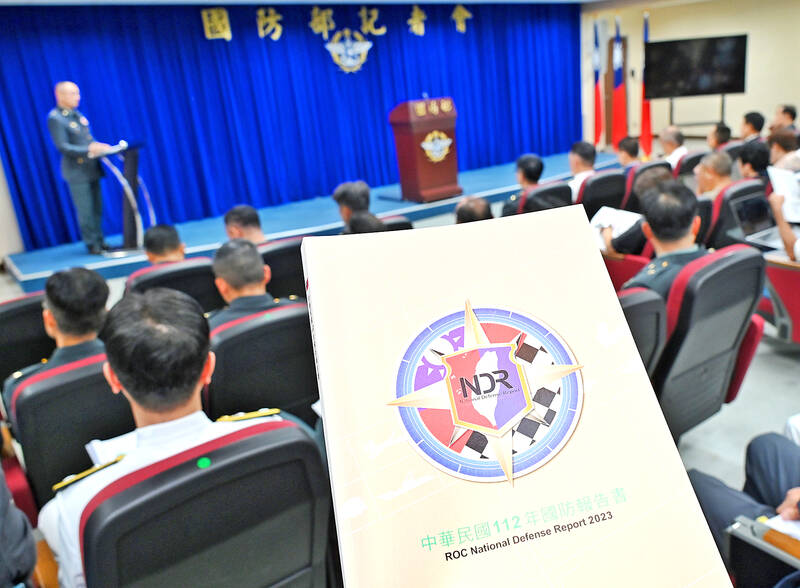China is bolstering its air power along the coast facing Taiwan with a permanent deployment of new fighters and drones at expanded air bases, the Ministry of National Defense said yesterday in its biennial report.
China has ramped up its military activities near Taiwan in response to what Beijing calls “collusion” between Taiwan and the US, and to prevent “Taiwan independence.”
In its National Defense Report, the ministry said China uses “realistic combat training and exercises to strengthen its preparedness against Taiwan.”

Photo: Liu Hsin-de, Taipei Times
“The Chinese communists have been completing the expansion of airfields along the coastline of its eastern and southern theater commands, realigning new fighters and drones to be permanently stationed there,” the report said.
China’s frequent drills to Taiwan’s north and south and into the Pacific show its efforts to “intimidate” Taiwan from both its east and west, it said.
Taiwan has been pursuing a strategy of asymmetric defense by improving its long-range, precision, uncrewed, maneuverability and artificial intelligence capabilities.
The ministry said if there were clear signs of a Chinese invasion, it could “pre-emptively strike its mobilizing invasion forces” with precision weapons.
The report outlined the “gray zone” — ostensibly non-military methods — China also uses against Taiwan.
The ministry said that included weather balloons over the Taiwan Strait that are actually for spying purposes, and civilian aircraft used for surveillance.
The report added that as in the Russia-Ukraine war, China is also deploying hybrid warfare to target Taiwan through military coercion and nontraditional threats, including cyberwarfare and cognitive warfare.
In response, the report says that the military is upholding its long-held “resolute defense and multi-domain deterrence” strategic guidance, and continuing to beef up its asymmetrical warfare capabilities in the face of a much stronger opponent.
Learning from the example of Ukraine, Taiwan is also beefing up its defense capabilities by reforming its reservist system by extending compulsory military service from four months to one year starting on Jan. 1 next year and publishing an “all-out-defense” handbook, it said.
Meanwhile, China had 20 naval vessels near Taiwan in the 24 hours leading up to 6am yesterday, the ministry said in a post on X.
The vessels include the Shandong aircraft carrier, which the ministry earlier said was traveling southeast of Taiwan.
Thirteen Chinese military aircraft had crossed the median line of the Taiwan Strait, the ministry added.
Speaking on the sidelines of a briefing in Taipei to release a Ministry of National Defense strategy report, Major General Huang Wen-chi (黃文啓) said that Taiwan could expect more of the same from the People’s Liberation Army (PLA) in the future.
“The PLA pressure will continue and we think the pressure tomorrow will be larger than today,” he said. “As of now, we haven’t seen any goodwill from the Chinese Communist Party.”
Huang said the military would continue to monitor the movements of Chinese warplanes and warships.
The USS Ralph Johnson and the Royal Canadian Navy’s Halifax-class frigate HMCS Ottawa sailed through the Taiwan Strait on Saturday. The timing coincided with a G20 leaders’ summit in New Delhi.
The US routinely sails through the Taiwan Strait in what it calls “freedom of navigation” operations, which China sees as provocative actions.

SECURITY: As China is ‘reshaping’ Hong Kong’s population, Taiwan must raise the eligibility threshold for applications from Hong Kongers, Chiu Chui-cheng said When Hong Kong and Macau citizens apply for residency in Taiwan, it would be under a new category that includes a “national security observation period,” Mainland Affairs Council (MAC) Minister Chiu Chui-cheng (邱垂正) said yesterday. President William Lai (賴清德) on March 13 announced 17 strategies to counter China’s aggression toward Taiwan, including incorporating national security considerations into the review process for residency applications from Hong Kong and Macau citizens. The situation in Hong Kong is constantly changing, Chiu said to media yesterday on the sidelines of the Taipei Technology Run hosted by the Taipei Neihu Technology Park Development Association. With

CARROT AND STICK: While unrelenting in its military threats, China attracted nearly 40,000 Taiwanese to over 400 business events last year Nearly 40,000 Taiwanese last year joined industry events in China, such as conferences and trade fairs, supported by the Chinese government, a study showed yesterday, as Beijing ramps up a charm offensive toward Taipei alongside military pressure. China has long taken a carrot-and-stick approach to Taiwan, threatening it with the prospect of military action while reaching out to those it believes are amenable to Beijing’s point of view. Taiwanese security officials are wary of what they see as Beijing’s influence campaigns to sway public opinion after Taipei and Beijing gradually resumed travel links halted by the COVID-19 pandemic, but the scale of

A US Marine Corps regiment equipped with Naval Strike Missiles (NSM) is set to participate in the upcoming Balikatan 25 exercise in the Luzon Strait, marking the system’s first-ever deployment in the Philippines. US and Philippine officials have separately confirmed that the Navy Marine Expeditionary Ship Interdiction System (NMESIS) — the mobile launch platform for the Naval Strike Missile — would take part in the joint exercise. The missiles are being deployed to “a strategic first island chain chokepoint” in the waters between Taiwan proper and the Philippines, US-based Naval News reported. “The Luzon Strait and Bashi Channel represent a critical access

Pope Francis is be laid to rest on Saturday after lying in state for three days in St Peter’s Basilica, where the faithful are expected to flock to pay their respects to history’s first Latin American pontiff. The cardinals met yesterday in the Vatican’s synod hall to chart the next steps before a conclave begins to choose Francis’ successor, as condolences poured in from around the world. According to current norms, the conclave must begin between May 5 and 10. The cardinals set the funeral for Saturday at 10am in St Peter’s Square, to be celebrated by the dean of the College